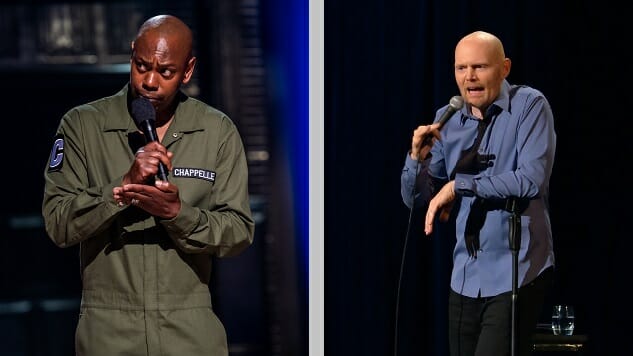Bill Burr and Dave Chappelle Don’t Understand Society in 2019, and They Don’t Want To Try
Photos courtesy of Netflix; Chappelle photo by Mathieu Bitton
“Everything has become fucking absolutes,” Bill Burr declares on his latest special, Paper Tiger. In that particular instance, he was referring to the die-hard “patriots” opposed to Colin Kaepernick’s police brutality protest and, later on, the #MeToo movement. During his hour on the Royal Albert Hall stage, Burr attempts to find the gray in both situations, but en route shows the absolutes he lives by—absolutes that, coincidentally, keep him from being relevant. Netflix released Paper Tiger shortly after Dave Chappelle’s doggedly controversial special, Sticks and Stones, and the parallels are difficult to overlook. Over a total of roughly two hours, both comedy greats manage to get in some genuine laughs, but ultimately stumble when trying to discuss the social mores of 2019.
Burr starts off with a trial-by-fire, using the first two minutes to portray PC culture as whiny and then starting in on jokes using transgender people as a punchline. Later on, he manages to make valid points about white women benefiting from many of the same privileges as their male counterparts, but on the way reveals one of his own absolutes: women are a joke. Women are the punchline. Nothing is funnier than doing his stilted high voice and declaring that “If you have a dick and balls, we don’t want to hear it!” Feminists are stupid and rape accounts can be as close to fiction as Star Wars (this perspective is especially disappointing considering the candor with which he explores his own sexual assault). Even his takedown of male feminists—aptly pointing out that many dudes identify as such to a) get into women’s pants or b) deflect from their own past wrongdoing—falters when he reveals the machismo rendering Burr a veritable fossil. To him, male feminists don’t just have questionable motives, but are also missing their manhood. It’s a concept pulled from the most trite, testosterone-overdosed set in a forgettable comedy club.
On the other hand, Burr kills when talking about his marriage, his temper and even robot sex (yes, it will likely destroy humankind). Funnily enough, though, one of the tales from Burr’s childhood reveals that his absolutes run deep. When speaking about the origins of his temper, he recounts how his father gave him a doll for Christmas as a punishment and he burst into tears. That’s the kind of thing that began to stoke his rage, a traditionally feminine toy. And sure, he’s a comedian, so it’s possibly an invented vignette, but the fact that it’s the sort of event he could see as igniting an ongoing temper reveals a lot.
-

-

-

-

-

-

-

-

-

-

-

-

-

-

-

-

-

-

-

-

-

-

-

-

-

-

-

-

-

-

-

-

-

-

-

-

-

-

-

-








































